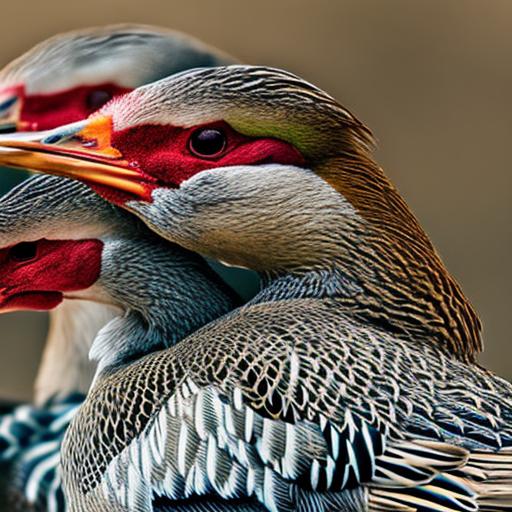Keeping geese and chickens together can be a rewarding and beneficial experience for poultry enthusiasts. Not only do geese and chickens provide companionship and entertainment, but they also offer practical benefits such as pest control and egg production. By understanding the nature of geese and chickens, providing appropriate housing, feeding them a balanced diet, and managing their social dynamics, it is possible to successfully keep these two species together.
Key Takeaways
- Geese are social animals that form strong bonds with their flock, while chickens are more independent and territorial.
- Keeping geese and chickens together can provide benefits such as increased protection from predators and improved foraging behavior.
- Housing for geese and chickens should provide ample space and protection from the elements, with separate areas for nesting and roosting.
- A balanced diet of grains, greens, and protein is important for the health and productivity of both geese and chickens.
- Regular health checks and preventative measures such as vaccinations and parasite control are crucial for maintaining the well-being of mixed flocks.
Understanding the Nature of Geese and Chickens
Geese are known for their strong flocking instinct and their ability to bond with their human caretakers. They are highly social animals that thrive in the company of others. Geese are also known for their protective nature, making them excellent guard animals. On the other hand, chickens are more independent and tend to form smaller social groups within a larger flock. They are curious animals that enjoy exploring their surroundings and scratching the ground for food.
The Benefits of Keeping Geese and Chickens Together
One of the main benefits of keeping geese and chickens together is pest control. Geese are natural grazers and will happily eat grass, weeds, and insects, helping to keep your yard or pasture free from unwanted pests. Chickens also play a role in pest control by eating insects, worms, and other small creatures. By combining the foraging abilities of geese with the scratching behavior of chickens, you can effectively manage pests in your outdoor space.
Another benefit of keeping geese and chickens together is egg production. While geese are not as prolific egg layers as chickens, they do lay eggs during the breeding season. Geese eggs are larger than chicken eggs and have a rich flavor that many people enjoy. By having both geese and chickens in your flock, you can have a variety of eggs to enjoy or sell.
Housing Requirements for Geese and Chickens
When it comes to housing requirements, geese and chickens have different needs. Geese require a larger space to roam and graze, as well as access to water for swimming and bathing. They also need protection from predators, such as foxes or raccoons. A secure fence or enclosure is essential to keep geese safe.
Chickens, on the other hand, need a coop that provides shelter from the elements and protection from predators. The coop should have nesting boxes for egg-laying and perches for roosting. Chickens also need access to a run or outdoor space where they can scratch and forage.
Feeding and Nutrition for Geese and Chickens
Geese and chickens have different dietary requirements, but their diets can be easily managed together. Geese are primarily grazers and should have access to fresh grass or pasture. They also benefit from a balanced poultry feed that provides essential nutrients. Chickens, on the other hand, require a diet that includes grains, seeds, vegetables, and protein sources such as insects or mealworms.
To provide a balanced diet for both geese and chickens, you can offer them a combination of fresh grass or pasture, poultry feed, and kitchen scraps. It is important to ensure that they have access to clean water at all times.
Health Considerations for Geese and Chickens

Both geese and chickens are generally hardy animals, but they can be susceptible to certain health issues. Geese are prone to respiratory infections and foot problems if they are kept in damp or dirty conditions. Chickens can be affected by parasites such as mites or lice, as well as respiratory diseases.
To prevent health issues, it is important to provide clean and dry housing for both geese and chickens. Regular cleaning of their living areas and providing proper ventilation can help prevent respiratory infections. Regular inspections for parasites and appropriate treatment if necessary are also important.
Social Dynamics of Geese and Chickens in Mixed Flocks
Geese and chickens can coexist peacefully in a mixed flock, but it is important to manage their social dynamics. Geese are generally protective of their territory and may become aggressive towards other animals, including chickens. It is important to introduce geese and chickens gradually and provide enough space for each species to establish their own territories.
If conflicts arise between geese and chickens, it may be necessary to separate them temporarily or provide additional space for each species. Providing multiple feeding and watering stations can also help reduce competition and aggression.
Managing Space and Territory for Geese and Chickens
Providing enough space for geese and chickens is essential for their well-being. Geese require more space than chickens due to their larger size and grazing behavior. A general rule of thumb is to provide at least 20 square feet per goose and 4 square feet per chicken in their outdoor area.
It is also important to manage their territory to prevent overcrowding. Overcrowding can lead to stress, aggression, and the spread of diseases. Regularly monitoring the flock’s behavior and providing additional space if necessary can help prevent these issues.
Egg Production from Mixed Flocks of Geese and Chickens
Both geese and chickens have different egg-laying habits. Geese typically lay eggs during the breeding season, which is usually in the spring. They lay fewer eggs compared to chickens, but their eggs are larger and have a unique flavor.
Chickens, on the other hand, lay eggs throughout the year, with peak production during the warmer months. By having both geese and chickens in your flock, you can enjoy a variety of eggs throughout the year.
Predators and Protection for Geese and Chickens
Geese and chickens are vulnerable to a variety of predators, including foxes, raccoons, hawks, and snakes. It is important to provide adequate protection to keep them safe. This can be done by using secure fencing, covering the coop or enclosure with wire mesh, and providing a secure lock for the coop at night.
It is also important to be vigilant and regularly inspect the fencing and coop for any signs of damage or potential entry points for predators. Providing a safe and secure environment is essential for the well-being of geese and chickens.
Tips for Successfully Keeping Geese and Chickens Together
– Introduce geese and chickens gradually to allow them to get used to each other’s presence.
– Provide enough space for each species to establish their own territories.
– Monitor their behavior and provide additional space if necessary.
– Provide a balanced diet that meets the nutritional needs of both geese and chickens.
– Regularly clean their living areas and provide proper ventilation to prevent health issues.
– Protect them from predators by using secure fencing and covering the coop or enclosure with wire mesh.
Keeping geese and chickens together can be a rewarding experience that offers both practical benefits and companionship. By understanding their nature, providing appropriate housing, feeding them a balanced diet, managing their social dynamics, and protecting them from predators, it is possible to successfully keep geese and chickens together. Whether you are interested in pest control, egg production, or simply enjoying the company of these animals, keeping geese and chickens together can be a fulfilling endeavor.
If you’re considering keeping geese and chickens together, it’s important to understand the dynamics and requirements of both species. While they can coexist harmoniously, there are certain considerations to keep in mind. To learn more about how to care for goslings and ensure their well-being alongside chickens, check out this informative article on Poultry Wizard: How to Care for Goslings. Additionally, if you’re looking for tips on creating a suitable coop for your chickens in the garden, this article on Poultry Wizard provides valuable insights: Garden Chicken Coop. For those located in Grand Island, NE, seeking a chicken coop specifically designed for their needs, this article offers guidance: Chicken Coop Grand Island, NE.
Meet Walter, the feathered-friend fanatic of Florida! Nestled in the sunshine state, Walter struts through life with his feathered companions, clucking his way to happiness. With a coop that’s fancier than a five-star hotel, he’s the Don Juan of the chicken world. When he’s not teaching his hens to do the cha-cha, you’ll find him in a heated debate with his prized rooster, Sir Clucks-a-Lot. Walter’s poultry passion is no yolk; he’s the sunny-side-up guy you never knew you needed in your flock of friends!







